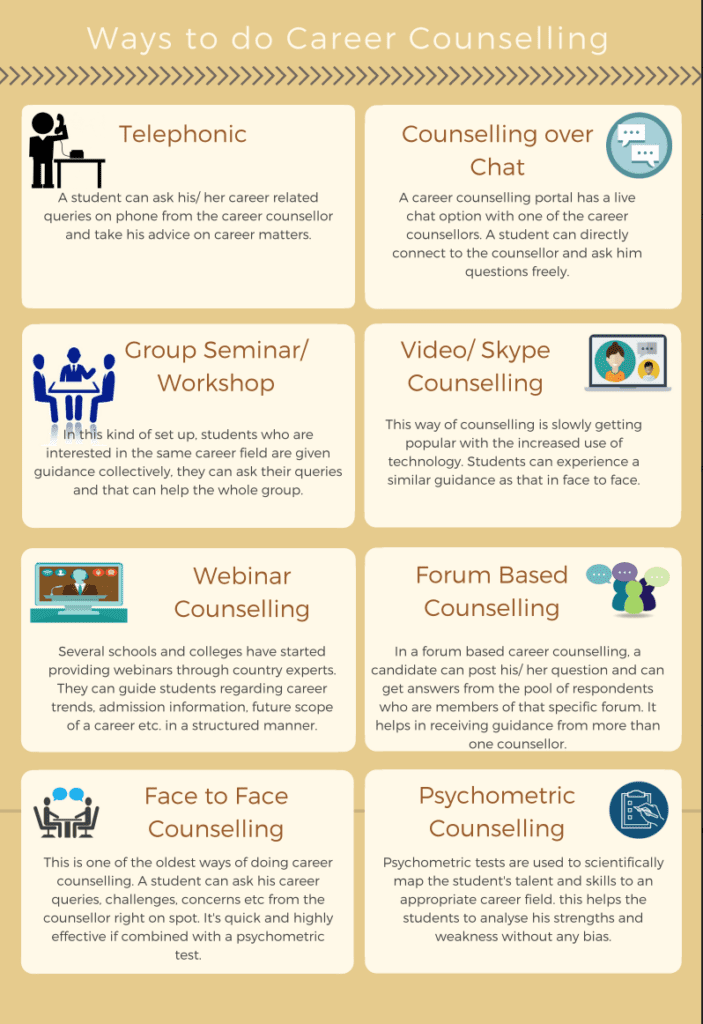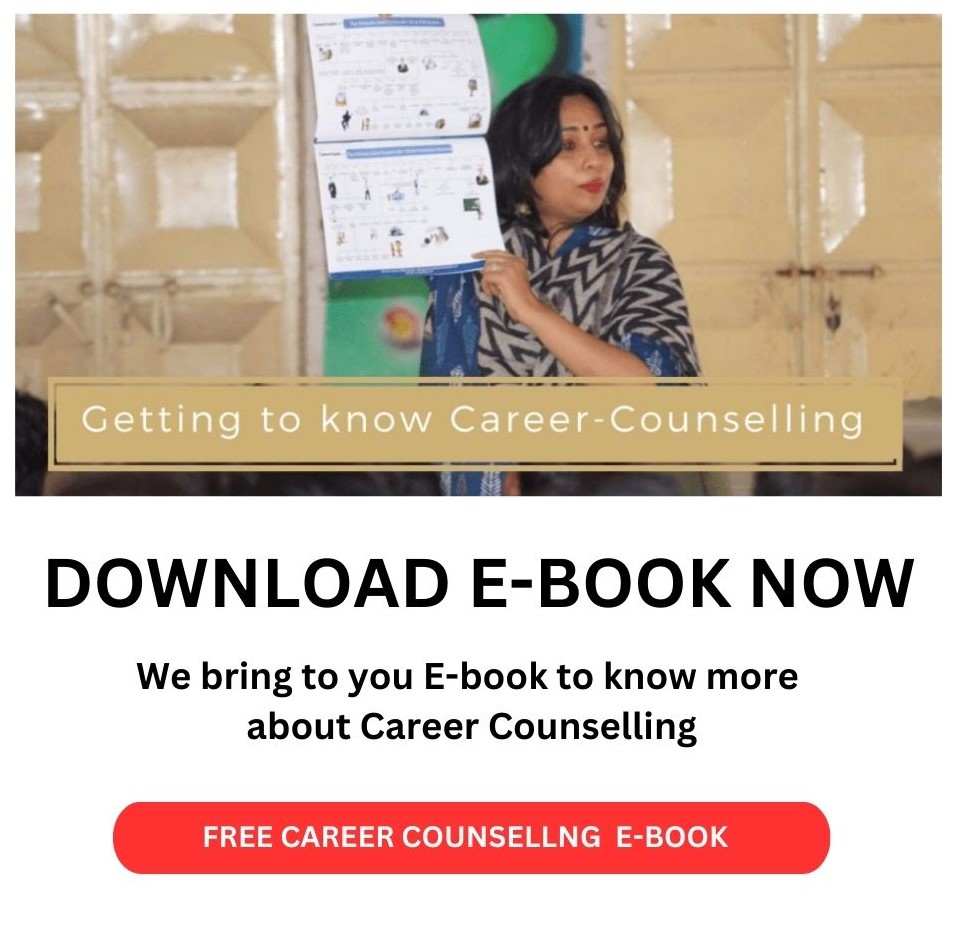Stage Of career counselling process assists students and professionals into the appropriate career path which resonates with their full potential. A professional counselor can help you to uncover your strength overcome barriers and help you realize your potential. A detailed process of a career counselling process session will be able to help you overcome a wide variety of confusion issues and provide ultimate guidance. You will read about Stages of counselling : 4 stages of career counselling.
Stages of Career Counselling
Psychometric Test
The first step is to conduct a psychometric test that aims to highlight one’s interest, personality, work style, attitude, etc. The objective of a Psychometric test is to assess you to know what career you are more suited to Stage Of Counselling These tests are used to evaluate human thought and behavior. The test serves as a medium for sales exploration awareness. Psychometric assessment helps students to inherit and understand their strengths and potential.
Q. What is a psychometric test?
A. A psychometric test is a standardized assessment tool designed to measure a person’s mental abilities, personality traits, aptitudes, and other attributes.
Q. What are the types of psychometric tests?
A. The two main types of psychometric tests are aptitude tests and personality tests. Aptitude tests measure cognitive abilities such as verbal reasoning, numerical reasoning, and spatial reasoning, while personality tests measure various aspects of an individual’s personality, such as introversion/extroversion, emotional stability, and openness to experience.
Q. What is the purpose of psychometric tests?
A. The purpose of psychometric tests varies depending on the context in which they are used. For example, employers may use psychometric tests to assess a job candidate’s suitability for a particular role, while schools may use them to assess students’ academic abilities.
Q. How can I prepare for a psychometric test?
A. There are a few things you can do to prepare for a psychometric test, such as getting enough sleep, practicing test-taking skills, and familiarizing yourself with the format of the test. However, it is important to note that it is difficult to prepare for the specific content of a psychometric test, as it is designed to measure innate abilities and traits.
Analysis
Analysis is the process of breaking down a complex system, concept, or phenomenon into smaller parts to understand its nature and behavior. It is an important tool in problem-solving, decision-making, and research. Analysis involves identifying the components of a system, examining their relationships, and evaluating their significance. It can be qualitative or quantitative, depending on the type of data and research questions involved.
Qualitative analysis involves non-numerical data, such as interviews, observations, and text data, which are analyzed to identify themes, patterns, and meanings. Quantitative analysis, on the other hand, involves numerical data, such as statistics, graphs, and surveys, which are analyzed using mathematical and statistical tools.
Q. What are the types of analysis?
A. There are several types of analysis, including data analysis, financial analysis, market analysis, risk analysis, cost-benefit analysis, and more. Each type of analysis focuses on a different aspect of a problem or situation.
Q. What are the steps in the analysis process?
A. The steps in the analysis process may vary depending on the type of analysis being conducted, but generally, they include defining the problem, gathering data, analyzing the data, drawing conclusions, and communicating the results.
Q. What is cost-benefit analysis?
A. Cost-benefit analysis is the process of evaluating the costs and benefits of a particular project, program, or policy. It involves comparing the expected costs and benefits of different alternatives and assessing their net impact on society or the organization.
Career Exploration
Exploration helps the student to dive into self-analysis, the counselor analysis different skills of the student. The counselor links the attribute of a student to an available professional career. They discuss information related to work experience, professional network and explore available options based on talent and interest. A counselor executes the plan and helps a student to meet his deadlines and complete his work.
FAQs About Stages of Career Counselling
Q. What are the stages of career counseling?
A. The stages of career counselling process typically involve four main phases: assessment, exploration, goal-setting, and implementation. During the assessment stage, the counselor works with the client to identify their interests, skills, values, and personality traits. In the exploration stage, the client is encouraged to explore different career options and learn more about the job market. In the goal-setting stage, the client works with the counselor to establish clear goals and develop a plan for achieving them. Finally, during the implementation stage, the client puts their plan into action and receives support and guidance from the counselor.
Q. How long does career counseling typically last?
A. The duration of career counselling process can vary depending on individual needs, goals, and the complexity of the career exploration process. Some individuals may require only a few sessions, while others may benefit from more extensive counseling over several months. The counselor and client typically collaborate to determine the appropriate duration and frequency of sessions.
Q. How often should career counseling sessions take place?
A. The frequency of career counselling process sessions can vary depending on the client’s needs and availability. Initially, sessions may be scheduled more frequently to establish a strong foundation and make progress in the assessment and exploration stages. As the counseling process progresses, sessions may be spaced out to allow the client time for reflection, research, and goal implementation. Typically, sessions may take place weekly, biweekly, or monthly.
Q. Can career counseling help with mid-career transitions?
A. Yes, career counselling process can be beneficial for individuals at any stage of their career, including mid-career professionals seeking a change or transition. A counselor can assist in exploring new career options, assessing transferable skills, identifying potential challenges, and developing a strategic plan for making a successful transition.
Deep dive on career and courses and notify about entrance exams
Stage Of career counselling Since all the avenues have been explored it is time to prepare an action plan. The plan will allow you to go down your chosen route and see all the available options as well as a backup plan. Ensures preparation for any uncertainty that may arise at any time. The career counselors helps to list out colleges courses, building a portfolio, fee structure, entrance exam date, and preparation strategies. To get admission to your desired college. Select the most appropriate option and allocate all the resources and execute your plan.















